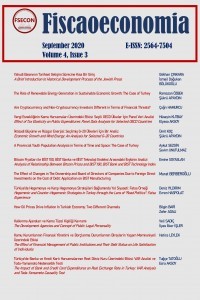
Fiscaoeconomia
Yazarlar: Gökhan KARTAL
Konular:Sosyal
DOI:10.25295/fsecon.2019.01.010
Anahtar Kelimeler:Exchange Rate,Foreign Trade,Exchange Rate Volatility,Cointegration,Granger Causality,Granger Causality
Özet: In this study, it is aimed to investigate with the help of three models using Johansen Cointegration and Granger causality tests foreign trade effects of exchange rate volatility experienced in recent years in Turkey. Model 2 covers a period of 01.2003-08.2013, where exchange rate fluctuations are relatively smooth and slow; Model 3 covers a period of 09.2013-08.2018, where exchange rate fluctuations are high in which events such as Gezi Park incidents, the July 15 Coup Attempt and Pastor Brunson crisis with the US. Model 1 covers the period of 2003.01-2018.08 including Model 2 and Model 3. According to the results of cointegration analysis, it is seen that there is a cointegration relationship in Model 1 and Model 2, and there is no cointegration relationship in Model 3. When the results of the causality test among the variables are examined, there is a one-way causality relation from exchange rate to import in Model 1 and a one-way causality relation from the exchange rate to import and from the exchange rate to export in Model 2. Whereas, there is no causality relation in Model 3. According to these results, it has been concluded that the exchange rate movements in recent years affect the cointegration and causality relationship between the variables.